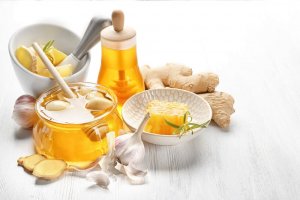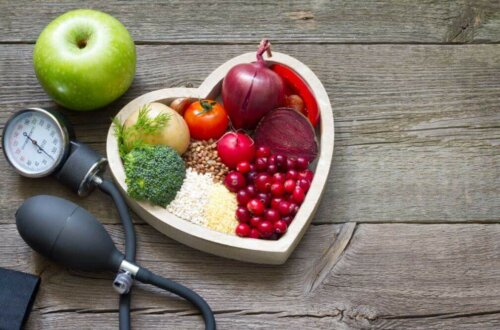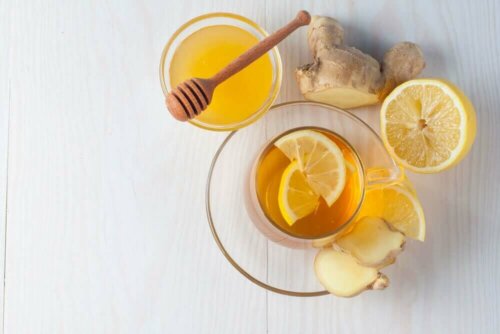A Ginger-Garlic-Honey Remedy for High Cholesterol


Written and verified by Doctor Carlos Fabián Avila
It’s said that the mixture of ginger, garlic, and honey is a good remedy for high cholesterol. Therefore, many people have been encouraged to prepare it and include it in their diet.
Below we’ll discuss in more detail everything you need to know about the ingredients in this remedy and its potential to improve your health, according to scientific evidence.
Things you need to know about high cholesterol
If you’ve been diagnosed with high cholesterol, it’s important to improve your lifestyle habits as soon as possible. The perfect combination is healthy eating and exercise. At the same time, you should quit smoking and minimize (or eliminate) the consumption of alcoholic beverages.
Some suggestions that may inspire you to improve your eating habits are the Harvard plate and the Mediterranean diet. However, the most important thing is to follow the recommendations of your treating physician.

Experts at the Spanish Heart Foundation have some recommendations:
- Substitute whole milk products for skimmed milk products, butter for olive oil, and fatty meats for lean meats with little fat
- Saturated fat should be reduced. Furthermore, they recommend reducing it to less than 10% of the diet.
- Eat more oily fish
- Intake of less than 7% of polyunsaturated fats
- Limit monounsaturated fat to 15-20% of the diet
- Consume less than 300 mg of cholesterol, 50-55 % of carbohydrates, and 15 % of proteins
- In addition, 20-30 g of fiber and enough calories to maintain an adequate weight
You might like: Try this Effective Diet to Reduce Bad Cholesterol
Ginger-garlic-honey remedy for high cholesterol
It’s believed the combination of ginger, garlic, and honey can help regulate cholesterol since all three ingredients are attributed with antioxidant properties.
According to experts from the Spanish Nutrition Foundation (FEN):
- Honey is a food that provides sugars, amino acids, tannins, glucose, and alkaloids. It’s been a highly valued food for its multiple therapeutic applications.
- Garlic provides protein, iodine, phosphorus, potassium, vitamin B6, and sulfur compounds. For a long time, various properties were attributed to garlic; however, studies have shown that there were many myths surrounding this food.
- Ginger provides protein, vitamins (B1, B2, B3, B5, B6, B9, C), magnesium, potassium, calcium, iron, manganese, zinc, phosphorus, and sodium. Although it has beneficial properties for health, it’s important to be aware of its contraindications.
Therefore, these are all healthy ingredients that can contribute to complement the diet aimed at lowering cholesterol and triglyceride levels. Note that there’s no evidence that this remedy for high cholesterol is, by itself, 100% effective. Therefore, we recommend including it alongside a healthy lifestyle as long as your doctor authorizes it.
Ingredients
- 4 cloves of garlic
- 1 c. of honey
- 8 c. of water
- 1 1/2 inch of ginger root
- 1/2 c. of lemon juice
Preparation
- Peel the garlic cloves and put them in a food processor with the ginger root
- Blend for a few minutes until you get a smooth paste
- Add the lemon juice along with the water
- Then, add the honey
- Strain the drink if necessary and pour it into a glass bottle or jar
- Finally, leave it for at least 5 days in a cool dark place. You can also keep it in the fridge if you prefer.
How To Use It
- You can take this remedy for high cholesterol on an empty stomach or before each meal
- You can also dilute a tablespoon in a glass of warm water and drink it with your breakfast
- Avoid consuming more than 1 tablespoon per day, since honey is a food with a large number of calories
- Ginger is contraindicated in some cases, so it’s essential to be well informed before starting to consume it

Watch what you eat!
Although the liver produces cholesterol, the cholesterol that comes from food is what mostly affects the body. So, watch what you eat! Remember that maintaining a balanced diet according to your needs will not only help you to enjoy good health but also to maintain a normal weight.
Remember to have an annual check-up so that your doctor can check your cholesterol levels, triglycerides, and blood sugar levels. If you’re in a high-risk group for cardiovascular illnesses, you should go more frequently.
All cited sources were thoroughly reviewed by our team to ensure their quality, reliability, currency, and validity. The bibliography of this article was considered reliable and of academic or scientific accuracy.
-
Thomson, M., Al-Qattan, K. K., Al-Sawan, S. M., Alnaqeeb, M. A., Khan, I., & Ali, M. (2002). The use of ginger (Zingiber officinale Rosc.) as a potential anti-inflammatory and antithrombotic agent. Prostaglandins Leukotrienes and Essential Fatty Acids. https://doi.org/10.1054/plef.2002.0441
-
Choudhary, A., & Verma, R. J. (2005). Ameliorative effects of black tea extract on aflatoxin-induced lipid peroxidation in the liver of mice. Food and Chemical Toxicology. https://doi.org/10.1016/j.fct.2004.08.016
-
Bogdanov, S., Jurendic, T., Sieber, R., & Gallmann, P. (2008). Honey for nutrition and health: A review. Journal of the American College of Nutrition. https://doi.org/10.1080/07315724.2008.10719745
This text is provided for informational purposes only and does not replace consultation with a professional. If in doubt, consult your specialist.








